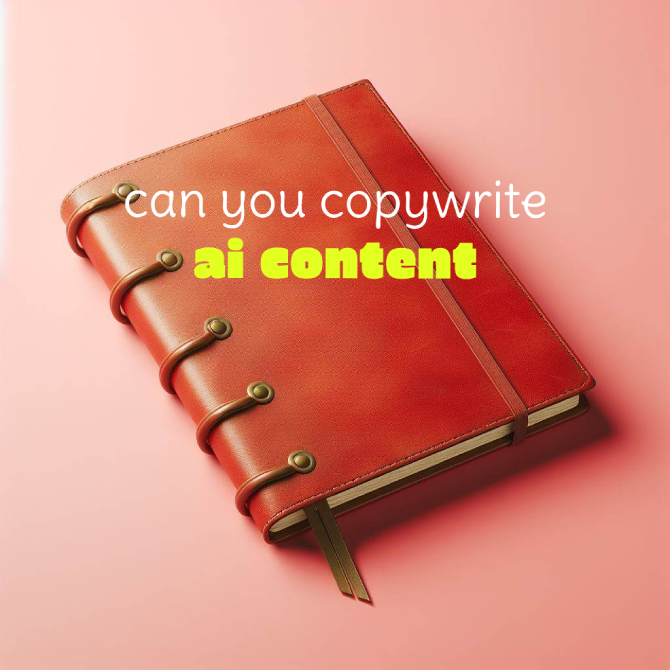
“AI copyright is such a complex issue but also an important one,” Richard Uzelac says.
Just as artificial intelligence’s complex nature, its copyright issue is in the same boat — We humans intend to perplex things more. According to insight from Mark S. Lee, a corporate and securities attorney, AI-created works are not protected by copyright law. A brief line from “Title 17 of the United States Code (U.S.C.)” (cite1) might help us understand otherwise instead.
“(a) Copyright protection subsists, in accordance with this title, in original works of authorship fixed in any tangible medium of expression, now known or later developed, from which they can be perceived, reproduced, or otherwise communicated, either directly or with the aid of a machine or device. Works of authorship include the following categories:
(1) literary works;
(2) musical works, including any accompanying words;
(3) dramatic works, including any accompanying music;
(4) pantomimes and choreographic works;
(5) pictorial, graphic, and sculptural works;
(6) motion pictures and other audiovisual works;
(7) sound recordings; and
(8) architectural works.
(b) In no case does copyright protection for an original work of authorship extend to any idea, procedure, process, system, method of operation, concept, principle, or discovery, regardless of the form in which it is described, explained, illustrated, or embodied in such work.
This goes on to mention that it does not protect facts, ideas, or common elements of a work. Therefore, the implication is that AI-generated content, lacking human authorship, does not fall under the purview of copyright protection.
Can people claim copyright protection with the help of AI assistance?
Yes, individuals can claim copyright protection for works they create with AI’s assistance. This protects certain aspects of the work, such as original and sufficiently creative text, the portrait depicted, and any other creative elements, which would be eligible for copyright protection if the human contribution is copyrightable. So the big question who would on the copyrighted work after its creation?
The U.S Copyright Office (cite2) –
“Individuals who use AI technology in creating a work may claim copyright protection for their own contributions to that work. They must use the Standard Application,[39]
“If a work’s traditional elements of authorship were produced by a machine, the work lacks human authorship and the Office will not register it.[26] For example, when an AI technology receives solely a prompt [27] from a human and produces complex written, visual, or musical works in response, the “traditional elements of authorship” are determined and executed by the technology—not the human user. Based on the Office’s understanding of the generative AI technologies currently available, users do not exercise ultimate creative control over how such systems interpret prompts and generate material. Instead, these prompts function more like instructions to a commissioned artist—they identify what the prompter wishes to have depicted, but the machine determines how those instructions are implemented in its output.[28] For example, if a user instructs a text-generating technology to “write a poem about copyright law in the style of William Shakespeare,” she can expect the system to generate text that is recognizable as a poem, mentions copyright, and resembles Shakespeare’s style.[29] But the technology will decide the rhyming pattern, the words in each line, and the structure of the text.[30] When an AI technology determines the expressive elements of its output, the generated material is not the product of human authorship.[31] As a result, that material is not protected by copyright and must be disclaimed in a registration application.[32]
In other cases, however, a work containing AI-generated material will also contain sufficient human authorship to support a copyright claim. For example, a human may select or arrange AI-generated material in a sufficiently creative way that “the resulting work as a whole constitutes an original work of authorship.” [33] Or an artist may modify material originally generated by AI technology to such a degree that the modifications meet the standard for copyright protection.[34] In these cases, copyright will only protect the human-authored aspects of the work, which are “independent of” and do “not affect” the copyright status of the AI-generated material itself” (cite3)
So, to answer the big question, who owns the copyright after its creation?
It would then be the author; the copyright office’s instruction states that a human must create the expressive elements of a work. This means that for a work to be eligible for copyright protection, it must involve human creativity and input — the bedrock requirement for copyright right now.
Citations
https://www.findlaw.com/
https://www.federalregister.gov/d/2023-05321/p-1
https://www.federalregister.gov/documents/2023/03/16/2023-05321/copyright-registration-guidance-works-containing-material-generated-by-artificial-intelligence
